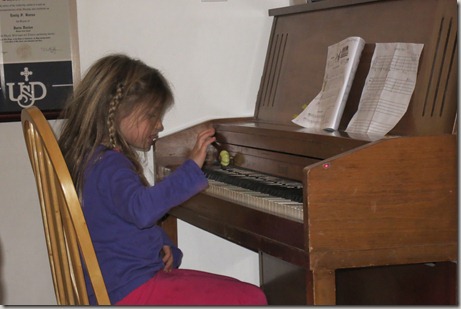I hear the piano wrestled into submission, notes pinging to my ears in a familiar tune. Mary had a little…a little…a lit-tle…MARY HAD A…mary HAD a little…Mary had a little lamb! Every now and then Erin hits all the notes the right way, but it’s not often. She’ll get better.
We started Erin in private piano and music classes when the school year started. The music class, a computer-based group lesson that involved putting shapes on a screen and printing off pages to take home and throw away, proved a total waste of time. It was supposed to, I think, introduce young children to the idea of music having visual representations that can be manipulated and turned into different sounds in orchestration. What it did, instead, was encourage the kids to do four seconds of object placements, then try to flag the teacher down to print their music sheet. Erin was bored, I was bored (I couldn’t sit in the class with her, but nor could I leave the music school grounds, so I spent 40 minutes each week sitting out in the hallway, with an equally bored Adrian), and by the end of the session she couldn’t do anything that she couldn’t already do much better on our computer at home (or with an iPad). It was almost like the teacher was an obstacle to the computer program, instead of using the program to facilitate a lesson. We did not re-register for the new session.
Erin’s piano lessons have proven to be a different challenge. She is never bored. She loves performing, and getting music right, and showing the teacher what she can do. She loves learning, and with the music book she is using for her lessons she actually learns things like what notes are called, and how long to hold them based on their representation. No, Erin’s obstacle in her piano lessons is me.
Erin has instructions from her teacher to practice every day, and to do a certain number of exercises and worksheets to accompany her sight-reading. This requires, however, that I remind her to practice, and remind her to do her worksheets; and I am the worst person in the world to keep anyone else on top of their homework. Some weeks are better than others; but some weeks are one day long, short cram sessions to squeeze a week’s worth of knowledge into her head the night before her lesson. When your father is a procrastinator, you might be doomed to procrastinate too.
Compounding my sin, I have the impatience only someone who is himself a somewhat frustrated musician can have when his progeny refuse to turn prodigy. Of the two parents in the house, I’m the one with the most music training, so I work with Erin on her lessons. I refuse to accept that she can’t recognize the B below middle-C on the staff: It’s right there! Look at it! Just, I don’t know, count one down from middle-C. I will not tolerate Erin telling me “I can’t do it” or “It’s too hard”, reading into her pleas a malingering ploy rather than what is probably the truth: she is not getting enough practice.
The last-minute cram sessions are frustrating for the both of us, and I’m starting to realize that it’s almost all my fault. Sure, Erin exaggerates her short-comings for sympathetic effect; I did the same thing when I was younger. And older. And probably recently. But I’m the one who turns into a crazy person because my daughter keeps trying to play middle-C with her index finger instead of her thumb. It’s pressure I’ve put on myself by letting her go without practice; by being worried that she’s not going to get all her learning done by the time the next lesson comes around; by being worried about her failing. I’m imparting all of that anxiety to her. I can feel myself doing it.
I don’t think I should hold her to soft standards. But I do recognize that I’m the source of many of the things that are frustrating about our piano time. I don’t want her to strive for perfection at the cost of being good. That’s a flaw in my own being, and if there’s something I don’t want her to emulate in me, it’s that.
But still: middle-C is right there, kid, so that one is A. Look at the music, not at your fingers! You’re slowing down. You call that a half-note? Drop and give me twenty scales!
All of that over an instrument I can’t even play myself. Heaven help her when she asks me to teach her how to play the guitar.


My husband is a musician, and he says he would never, ever give music lesson to kids….or adults. He doesn’t have the patience and it would drive him crazy.
@Karen,
I don’t blame your husband one little bit.
Yup. I play the violin, among other things, and my kiddo decided to take it up when it came time to choose instruments at school. I said “Cool, I can help you learn it.” Oh, no, no, no. It was an exercise in frustration accompanied by tears. We’ve gotten better at it over the last two years, but I have so much more respect for my music-teacher mother now.
@Kim,
She keeps asking me to teach her to play the violin. Uh, let’s start with something that doesn’t have you doing two completely different kinds of things with your hands, little miss. Also, I could hear the screeching in my mind. I remember learning it, and the sounds…the sounds were not good. At least with piano the notes are always in tune, even if they’re wrong.
Haha… “I could hear the screeching in my mind…” I CAN HEAR IT TOO OH GOD
My husband and I both have musical training (we both play piano, and between us also cover violin, ukulele, and a few other instruments). We’re happy to encourage our daughter’s interests (and not force her to do stuff she hates), but we have agreed that piano lessons aren’t optional.* We have also agreed that neither of us will teach her—help, yes, but not do the real teaching. We aren’t trained pedagogues, and the parent-child relationship is much different from the teacher-student relationship. That’s why we are happy to pay a local piano teacher (who, very conveniently, lives four doors up the street from us!) to teach our daughter.
She’s seven, and in her second year of piano now. Early this fall we started having trouble with practice and trying to fit it in at the end of the day (along with homework, going outside to play, and just being a kid). This caused a fair amount of frustration until we happened upon a solution that works really well for us: she practices as soon as she comes downstairs in the morning. By the time breakfast is on the table and the lunchbox is packed, she’s done her piano work. (We are more relaxed on weekends, when we’re not on a tight get-to-the-bus-stop-on-time schedule.)
__________
*Apparently this runs in my husband’s family. When he was a kid, someone asked his mom how she convinced him and his brother to do piano and violin lessons. She replied, “I never asked them.”
@Marsha,
I like the morning idea. Our problem is less about time than it is attention, so I’m going to hope we figure out something to help after dinner.
Attention was our problem, too. Sylvia had a hard time with post-school practicing because it vied with lots of things she either had to do (homework) or wanted to do (e.g., play outside with friends). Moving practice to the morning mitigated much of the attention problem: morning time isn’t time that she could use for any of those other activities (homework was done the day before, and no one’s playing outside at 7:20 a.m.), so she feels a lot less conflicted about practicing then.
Good luck with the music study in your house! I’m sure you’ll find a system that works for you, especially since it sounds like she derives genuine pleasure from playing music. :)
Ha! Well, it’s my attention problem.
She’ll always feel good to know that at least her dad cared she was playing the wrong notes and did something about it. 22233a4aqaw56112222222`22345d68990u-i=zzbnm(sorry this interlude was typed by the 2yo) Good thing she’s not trying the something from the brass section ;)
@O’Frizz Thirty,
Let’s hope you’re right.
We started music lessons this month. The 9YO is doing far better with her violin than I expected. The 5YO is willing to do his daily piano practice with little struggle. I agree with the earlier commenter about timing practice in the day when your kid is at his/her best. For my 9YO it’s at night – after homework is done and she can focus (and I can be her willing audience). For my 5YO, we (I sit with him and run him through his exercises) work best after dinner – after we’ve had a chance to raise our blood sugars and reconnect over the dinner table.
Looking back on my own musical education, I remember my mom taking me to local concerts and theater performances. While I sometimes felt a little overwhelmed by professional (and good amateur) musicians, I was often inspired to see what consistent and dedicated practice could lead to. Perhaps you could find a local middle school or high school concert to take her to. Seeing how it all fits together may fuel the drive for both of you.
That’s probably exactly why my mother (the swimming/diving/syncronized-swimming champ) couldn’t teach us to swim.
Good stuff. we’re about to begin piano lessons around here and I am thrilled that my wife wants to run the point on this one. Also, one of the things I admire most in parents is the awareness that such difficulties almost always come from us, not them. Good on ya, sir.